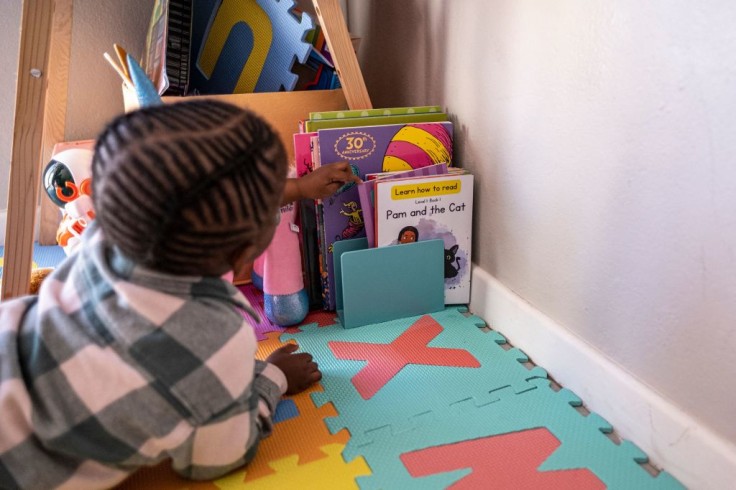
Reading books to babies is not only a cherished bonding experience but also a powerful tool for their development. The benefits of this simple yet enriching activity are far-reaching, impacting their cognitive, emotional, and linguistic growth.
According to Kids Health, as babies approach their first birthday, they naturally acquire the necessary language sounds. However, reading aloud plays a vital role in expanding their vocabulary and enhancing their speaking abilities.
By exposing babies to more words through reading, their linguistic network flourishes, leading to a more extensive word bank by the age of 2 compared to those who haven't been read to.
Additionally, early exposure to reading paves the way for timely literacy development. Yet the true significance of reading aloud lies in the connection it forges between a baby's most cherished elements-your voice, closeness, and books.
Engaging in shared reading sessions demonstrates the importance of reading and cultivates a positive association between happiness and books. Through joyful, exciting, and intimate reading experiences, new readers are born, setting the stage for a lifelong love of literature.
In this article, we will delve into the remarkable ways in which reading to babies enhances their overall development. From boosting brain power to establishing routines and fostering strong bonds, let's explore the many advantages of this delightful practice.
Benefits of Reading Books to Babies
Boosting Cognitive Abilities
According to Parents, one of the most significant benefits of reading books to babies is their positive impact on their brain development. As they listen to stories, their brains are stimulated, laying the foundation for strong cognitive abilities. The rich vocabulary, varied sentence structures, and vivid descriptions in books expose babies to a range of linguistic patterns and enhance their receptive language skills. This exposure helps expand their vocabulary and develop comprehension skills, setting the stage for future academic success.
Active Engagement and Response
Babies are highly perceptive, and reading books to them can elicit responses even at a young age. As you engage them in storytelling, they respond with coos, babbling, or gestures, indicating their attentiveness and interest. This interaction creates a feedback loop, encouraging babies to engage actively with the story, turning pages, pointing at pictures, and initiating conversation. Such early communication experiences lay a strong foundation for their future language development.
Foster Emotional Learning
Books provide an ideal platform for emotional learning, enabling babies to understand and navigate complex emotions. Stories often feature characters experiencing a range of emotions, allowing babies to observe and learn from these portrayals. As parents or caregivers read aloud with expressive voices, babies can pick up on tone, facial expressions, and emotional cues. These experiences facilitate emotional intelligence and empathy, crucial skills for healthy social and emotional development.
Establishing Routine and Structure
Incorporating reading into a daily routine helps establish a sense of structure and familiarity for babies. Designating a specific time for reading creates a predictable pattern in their lives, providing comfort and security. Consistent exposure to books and stories fosters a love for reading and makes it a natural part of their daily lives as they grow older. As babies become toddlers and eventually children, this routine can evolve into an independent reading habit that benefits their academic performance and lifelong learning.
Path to School Success
The positive effects of reading books to babies extend well into their academic journey. Numerous studies have highlighted the correlation between early exposure to books and long-term academic success. The early introduction to language, storytelling, and literacy through reading builds a solid foundation for future learning. As babies grow, their enhanced vocabulary, comprehension skills, and love for reading contribute to improved literacy rates, critical thinking abilities, and overall academic achievement.
Developing Language Skills
According to the Cleveland Clinic, reading books to babies plays a vital role in language development. The exposure to rich language and storytelling helps babies grasp the fundamental elements of communication, including vocabulary, grammar, and narrative structure. The rhythmic patterns, rhymes, and repetition in children's books provide linguistic cues that aid in language acquisition. Furthermore, reading aloud exposes babies to a broader range of words and phrases than they would encounter in everyday conversation, expanding their language repertoire.
Strengthening Bonds
Reading books to babies is a magical bonding experience that nurtures a strong emotional connection between parents or caregivers and their little ones. Snuggling up together with a book creates an intimate and soothing atmosphere, fostering a sense of security and love. The shared experience of reading strengthens the bond, creating cherished memories and building a solid foundation of trust and attachment.
Incorporating reading into a baby's daily routine is a gift that keeps on giving, nurturing a lifelong love for books and providing the essential building blocks for their intellectual, emotional, and social growth.
So, let's embrace the joy of reading and embark on this delightful journey of exploration, imagination, and development with our little ones.
Related Article: 10 Proven Strategies to Foster Your Toddler's Language Development